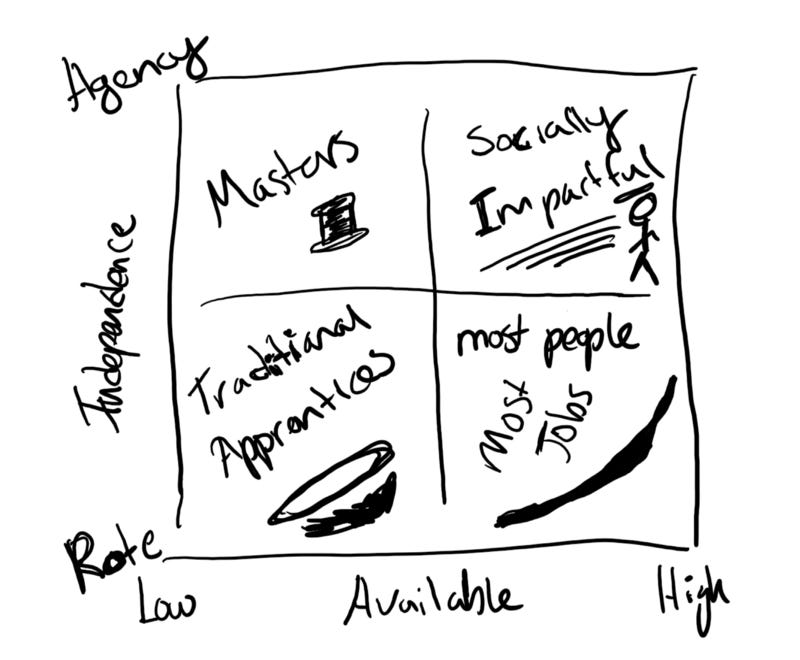Is there demand for my skills?
Employment markets aren't binary and the answer to any question is almost always "it depends". There are ways to think about your skills and market demand which can help.
“Are industrial engineers with six sigma experience in high demand in Singapore?” “Are developers with Python experience able to get jobs easily?” “I’m a great designer, will it be easy for me to get a job?” “I’ve been retrenched, are my skills in corporate finance still in demand?”
As broadly as these questions are worded: YES.
More realistically: it depends.
Employment markets aren’t binary
If you are willing to do ‘anything’, ‘anywhere’ at ‘any price’ your skills will always be in high demand. Fortunately, for all of us, whether our skills are in demand or not is just one of three important considerations for any job.
In almost every situation, it isn’t possible to say whether someone skills will make it easier for them to get a job. Look at all three areas together to get a better idea.
Highly available, high salary jobs are scams
Let’s start with looking at salary as that is often the most common thing people ask and talk about when they consider jobs.
The most commonly available jobs that almost anyone can do, with any skill level will pay very little. These kinds of jobs represent the majority of positions around the world. These are common jobs.
Jobs that are low paying and uncommon are normally roles with companies that are about to go bankrupt or provide some unique experience like ‘professional artist’. Though, maybe there should be another side to this chart showing ‘no-paying jobs’ that are highly available.
High paying jobs that are easy to come by are almost scams. These are recruiting, insurance sales, drug dealing and con-artist jobs.
The rest of the high paying jobs are uncommon due to the high barriers to entry. If the roles were readily available and easy to access, it wouldn’t make sense to pay higher salaries.
High paying jobs are not high paying because they require complex skills or high intelligence. High paying jobs are high paying because they are difficult to access. You will often need a certain kind of degree, network or experience. Sometimes this is an indication of your underlying capabilities or intelligence. More often, it is a sign of your family connections and wealth.
Jobs with the most agency are very uncommon
Next, consider jobs with high or low independence and related availability. Most jobs with rote learning at the beginning can eventually develop into roles with more independence.
The most common jobs and most people prefer roles that are clear, straight forward and easy to understand. While many people ask for independence in their work, they often would not trade security or pay for more independence. And often people would prefer not to invest in training at a low rate of income for many years for a chance of earning more as a master in their field.
Instead, we often end up in roles that are relatively rote, generally available and try to leverage the other matrix to get into the high paying ones. Investment bankers don’t do anything technically complicated. But they have relationships and social skills (due to educational and family backgrounds) that overcome those barriers.
Many people forget that even if they are investing in long-term skill building to become a master, that won’t guarantee them a high salary. The same barriers apply to a master as a trainee when the charts are layered.
This isn’t necessarily a bad thing. Being a ‘good’ Data Scientist or Software Engineer in the “Most People/Most Jobs” box could be greatly satisfying and secure if you are in the “Common Jobs” pay box. You can easily change jobs, have a lot of choice in company, etc. And, I’ve spoken with many software engineers who see their jobs as incredibly repetitious and rote, yet highly satisfying.
High agency roles with a large availability in the market are often/always low paying. Being a teacher or social worker often offers you massive independent agency (some teachers I know would argue otherwise as their administration micro manages their curriculum), but in general this category has that advantage.
The worst companies are easy to find
If you are a local industrial engineer in either country and have a good process improvement background, you can almost certainly find companies willing to hire you.
How many opportunities and how well (or badly) those opportunities pay depends less on your Industrial engineering degree and Lean cert and more on your ability to demonstrate value. Whether the company is the best or worst for you is generally easy to figure out after a few interviews and even some time on the job.
Remember that just because a job pays well doesn’t mean its going to be a great place to work.
Good luck with your choices.





